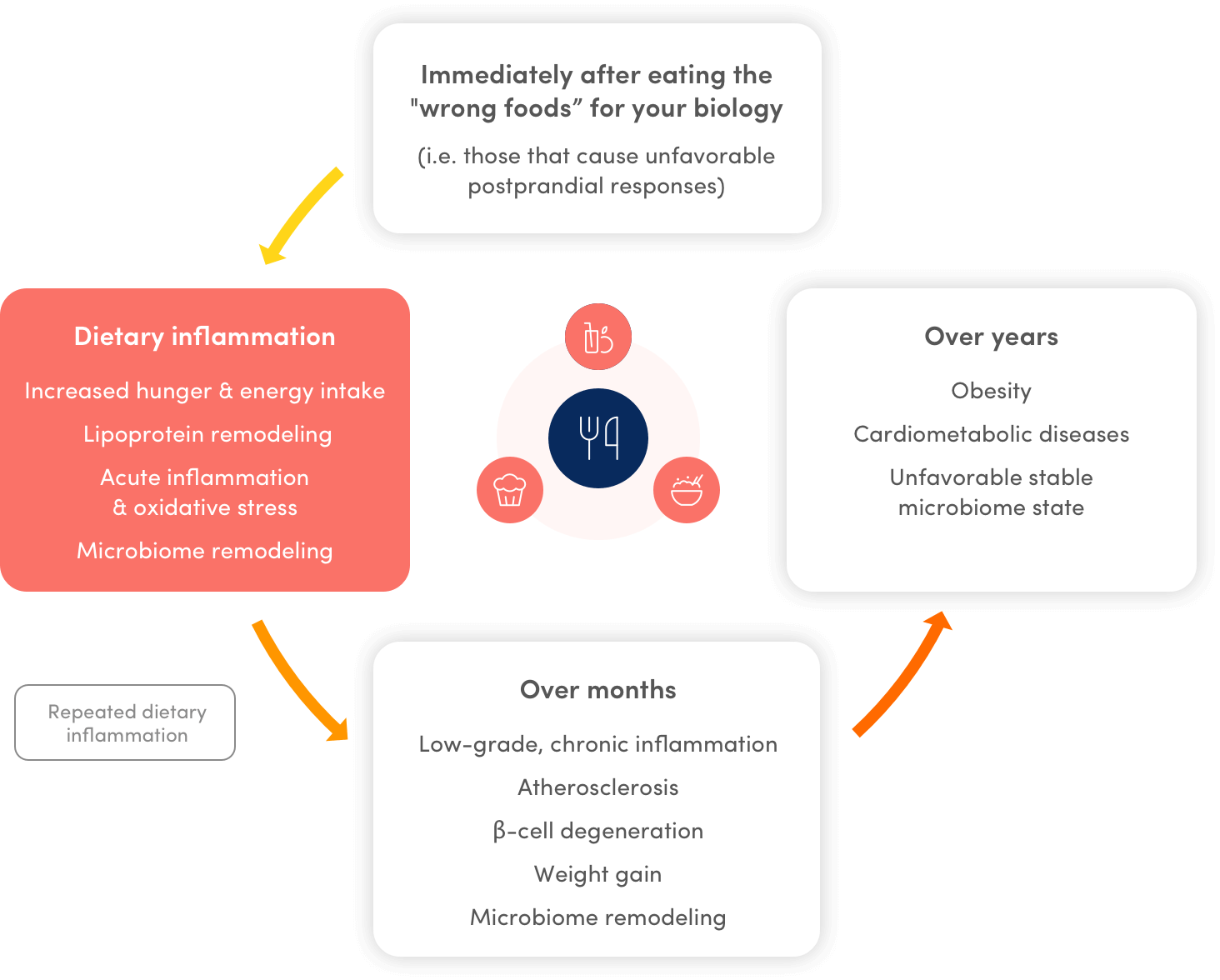New Study from ZOE Shows Significant Inflammatory Responses After Meals The largest ever in-depth study to look at postprandial inflammation highlights huge variability between people in response to food
Scientists at health science company ZOE and King’s College London today published novel research in the peer-reviewed American Journal of Clinical Nutrition. The study shows that acute and prolonged food-induced inflammation can increase the predicted risk of developing cardiometabolic diseases like cardiovascular disease. As the largest in-depth global study to look at postprandial inflammation, researchers found that inflammation, triggered by food, varies widely between individuals. Moreover, for the first time in a study of this scale, researchers were also able to identify the relative influence of blood sugar and blood fat levels on inflammation, demonstrating a stronger link with blood fat responses than blood sugar. These findings highlight the potential for personalized strategies to reduce chronic inflammation in preventative health.
The facts on inflammation and food:
Inflammation is a normal biological process caused by the immune system responding to injury. However, sustained long-term (chronic) inflammation is linked to many health conditions, including type 2 diabetes and heart disease
Researchers measured levels of fat, sugar and inflammatory markers in the blood of 1,000 PREDICT participants who had eaten set meals at specific times, making this by far the largest study of the impact of food on postprandial inflammation in the world
Most people experienced some level of inflammation after eating but the amount varied widely between people, depending on their unique biology.
For the first time, this study shows that changes in the levels of fat in the bloodstream after eating have a greater influence on inflammation than blood sugar levels. This shows that only concentrating on a single measure like blood sugar or blood fat is not the right strategy for overall dietary advice
There are several strategies that people can use to reduce food-induced inflammation
Understanding your personal nutritional responses after eating can enable you to make food choices that will help reduce inflammation and better support your health
Measuring inflammation after eating
Led by Dr. Sarah Berry and her team at King’s College London and ZOE, in collaboration with Massachusetts General Hospital and additional researchers in the US, UK, Italy, Spain and Sweden, the PREDICT study invited 1,002 healthy adults taking part in the PREDICT research program to come into the team’s research clinic for a day. They were all given two standardized meals to eat, each containing precise amounts of fat, carbohydrate, fiber and protein: breakfast (a muffin and a milkshake) and lunch 4 hours later (a muffin).
The researchers took blood samples from the participants before the breakfast meal and at nine points throughout the day. These were then analyzed to measure the levels of blood fat and sugar at the different timepoints, along with levels of two markers of inflammation, interleukin 6 (IL-6) and Glycoprotein acetylation (GlycA).
While IL-6 has conventionally been used as a measure of inflammation, GlycA has recently emerged as a more robust marker. Higher levels of GlycA are also associated with a number of health conditions, including fatty liver, type 2 diabetes, heart disease and some cancers.
Dr Sarah Berry from King’s College London, who led the study, explains, “Several small studies have previously tried to look at the relationship between food and inflammation, but the results have been inconsistent due in part to the challenges in measuring levels of inflammation after eating from blood samples. Thanks to recent advances in metabolic science, we were able to take advantage of a novel marker, GlycA, to gain new detailed insights into the connection between food and inflammation.”
Additionally, the researchers also gathered detailed data on the participants’ health, including information about their typical diet, a stool sample for microbiome analysis, and a body fat scan.
Individual inflammation responses after eating vary widely
The researchers found that the levels of inflammation after eating varied widely between participants, including identical twins, even though everyone had exactly the same meals at the same intervals.
For the first time in a study of this scale, the researchers were able to separate out the influence of blood sugar and blood fat levels on inflammation. While both unhealthy fat and sugar responses were associated with higher levels of inflammation after eating, blood fat was a stronger predictor of food-induced inflammation than blood sugar.
People with more body fat and greater body mass index (BMI) were more likely to have higher levels of inflammation after eating, supporting current evidence that management of obesity will reduce chronic inflammatory burden. Levels of inflammation also tended to be higher in males than females, and in older participants than younger ones.
How to control food-related inflammation
Berry explains, “Experiencing inflammation after eating is a normal biological response, but prolonged, sustained periods of inflammation have been linked to health conditions such as type 2 diabetes and heart disease. If you have less healthy responses to fat or sugar, then it’s easier to overload your system after eating, leading to increased inflammation.”
Based on these findings, Dr Berry recommends several strategies to help reduce the impact of inflammation after eating:
Control unhealthy blood fat responses by choosing whole foods that are higher in fiber and lean protein, increasing your intake of healthy omega-3 fats from sources like fish, nuts and seeds, and reducing your overall body fat
Control unhealthy blood sugar responses by choosing foods containing complex carbohydrates and fiber, such as whole grains, fruit and vegetables, and limiting sugary processed foods and sodas
Reduce inflammation after eating by choosing foods that are high in ‘anti-inflammatory’ bioactive molecules such as polyphenols, found in colorful fruits and vegetables and other plant-based foods
Understand your biology and choose foods that are less likely to cause unhealthy blood fat or sugar responses after eating
Tim Spector, Professor of Genetic Epidemiology at King’s College London and scientific co-founder of ZOE, adds, “Previous results from our PREDICT study showed that the combination of microbes living in our guts, known as the gut microbiome, is closely linked to how we respond to food, particularly fat. We have also found that microbiome composition is strongly associated with GlycA levels, opening the door to reducing food-related inflammation and improving health by manipulating the microbiome.”
To help bring this cutting-edge science to everyone, ZOE now offers an at-home test that measures blood fat, sugar and inflammation levels after eating, along with in-depth microbiome analysis, and provides personalized advice on the best foods to eat to support overall health.
Professor Spector concludes, “Our PREDICT research program is the largest study of its kind in the world, and results like this mark important steps forward in unpacking the complex connection between diet, inflammation and health. Our mission at ZOE is to enable anyone to understand their own unique biology and make food choices that optimize their health through the latest advances in nutritional science.”
Find out more about the ZOE at-home test and nutrition program at joinzoe.com.
Notes and resources:
Read more about the PREDICT research program: joinzoe.com/post/what-is-predict
Read more about how ZOE’s research uses standardized muffins to measure metabolic responses: joinzoe.com/post/muffin-metabolism-predict
Read ZOE’s White Paper on inflammation, diet and health: joinzoe.com/whitepapers/dietary-inflammation
Learn more about the science behind ZOE: joinzoe.com/whitepapers/overview
ZOE’s previous research on the link between the gut microbiome and responses to food: joinzoe.com/post/nature-microbiome-discoveries
Find out more about the ZOE at-home test and nutrition program at joinzoe.com

ZOE is a healthcare science company helping people understand their body’s responses to food. By using machine learning combined with large scale human studies, ZOE is decoding the impact of nutrition on health. ZOE leads the PREDICT Studies and the COVID Symptom Study, which are the world’s largest community-powered research programs of their kind in nutrition and COVID-19 respectively. Located in London and Boston, ZOE was founded by Professor Tim Spector of King’s College London, data science leader Jonathan Wolf and entrepreneur George Hadjigeorgiou. ZOE was named one of the Deloitte Fast 50 Rising Stars in 2019 for the company’s contribution to science enabled by technology and machine learning. For more information on ZOE’s mission and science, visit joinzoe.com.
Contact Details
ZOE
Fiana Tulip
+1 817-691-3031





